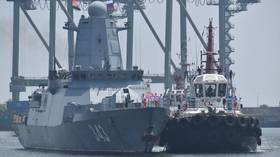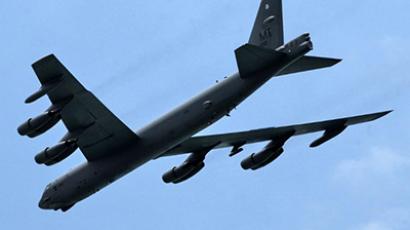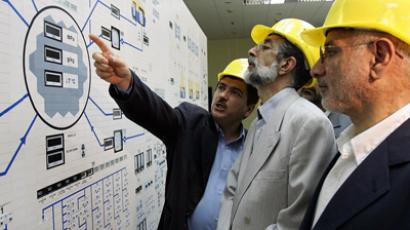Israel ‘postpones’ nuclear Iran red line by ‘8 to 10 months’
Iran’s decision to produce fuel rods from a third of its medium-enriched uranium stockpile delayed its alleged nuclear weapon program, says the Israeli defense minister. But Tel Aviv continues to advocate a military solution to halting it.
The Iranian move, which clearly clashes with its alleged goal of obtaining a nuclear bomb as soon as possible, is just a temporary set-back in Israel’s eyes and apparently does not change its aggressive rhetoric.Defense Minister Ehud Barak estimates that Israel and its allies will have to take decision over a military solution of the stand-off in “eight to ten months”, because sanctions and diplomacy will fail to curb Iran’s nuclear ambition, Britain's Daily Telegraph cites the minister as saying.Tehran denies having any intention of weaponizing its nuclear program, but refuses to stop uranium enrichment, which it says is needed for civilian purposes. The US, the EU and their allies have slapped Iran with crippling economic sanctions to force it to shut down its centrifuges, but so far the Islamic Republic remains defiant.In August, Iran converted some 38 per cent of its uranium enriched to 20 per cent into fuel rods for its civilian research reactor. Barak says the move somewhat postponed the critical moment after which Israel would evaluate that Iran has enough uranium to produce a nuclear weapon.The hawkish Israeli minister says the decision probably came in response to the “public discourse about a possible Israeli or American operation” against Iran, as a “diplomatic gambit” to win some time and to appease the UN’s nuclear watchdog, the International Atomic Energy Agency (IAEA).“Maybe it’s a combination of all these three elements. I cannot tell you for sure,” he told the newspaper.Barak insists that the move is just a temporary distraction and that Iran still wants to create a nuclear weapon.“They think of themselves as a major regional power from the dawn of history and they are determined not to fall into the trap that, in their mind, in their judgment, the late Gaddafi fell into,” he explained.Israel is determined to prevent this from happening and will make a final decision on an attack before Iran has fortified its enrichment facilities enough to make Israel incapable to significantly damage it using its own forces only.Barak said; “Basically, it’s about the question of when they come into this zone of immunity, where no Israeli surgical attack, probably somewhat later not even an American surgical attack, can delay them significantly. That’s the issue that bothers us.”
‘Arabs will be glad about strike on Iran’
Meanwhile Israeli Prime Minister Benjamin Netanyahu argued that an attack on Iran would defuse tensions in the Middle East rather then send them skyrocketing."Five minutes after, contrary to what the skeptics say, I think a feeling of relief would spread across the region," he told the French magazine Paris Match."Iran is not popular in the Arab world, far from it, and some governments in the region, as well as their citizens, have understood that a nuclear-armed Iran would be dangerous for them, not just for Israel," he added.The reasoning seems counterintuitive, since Iran pledged to retaliate en force to any military operation against it, targeting both Israeli and American forces deployed in the region. This is likely to trigger a major regional war, military experts warn.Both Netanyahu and Barak have voiced a number of veiled threats against Iran over its nuclear program over the past year. The Israeli PM spoke at the UN General Assembly last month, claiming that Tehran is on the brink of creating a nuclear device.Intelligence communities in Israel and the US are more skeptical, saying the Iran has long abandoned any attempts at producing an atomic bomb. Experts say if Tehran chose to change its course on the issue, it would take years before it would have both the weapon and the means to deliver it.The US and other Western countries refused to side with Netanyahu and set a time limit for Iran to halt uranium enrichment. While not ruling out a military solution, they say the prefer sanctions and diplomacy to take root.














